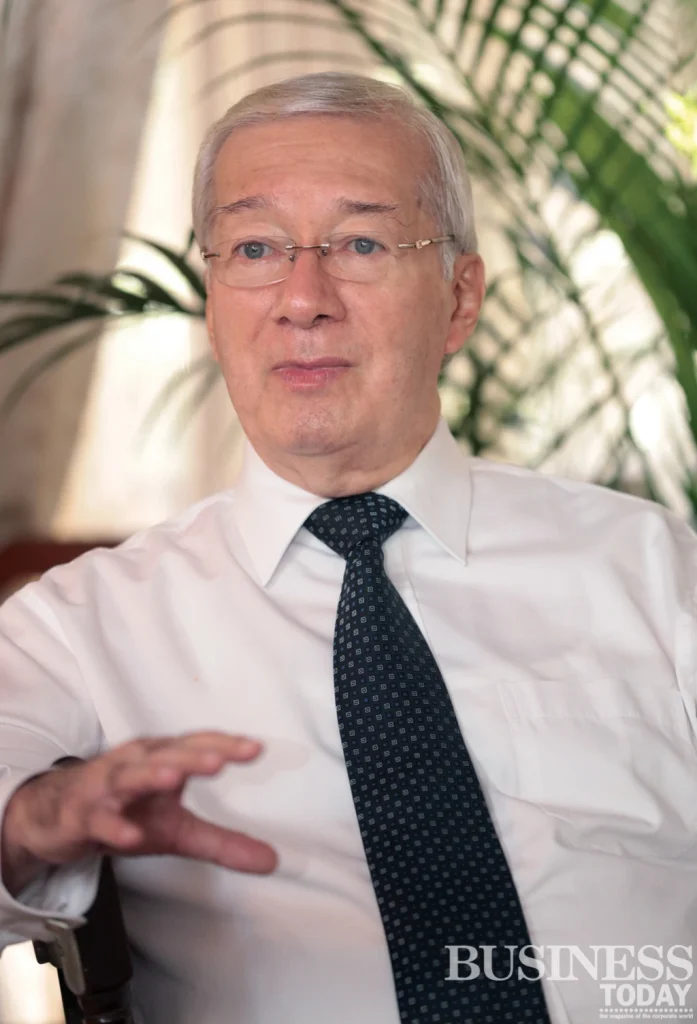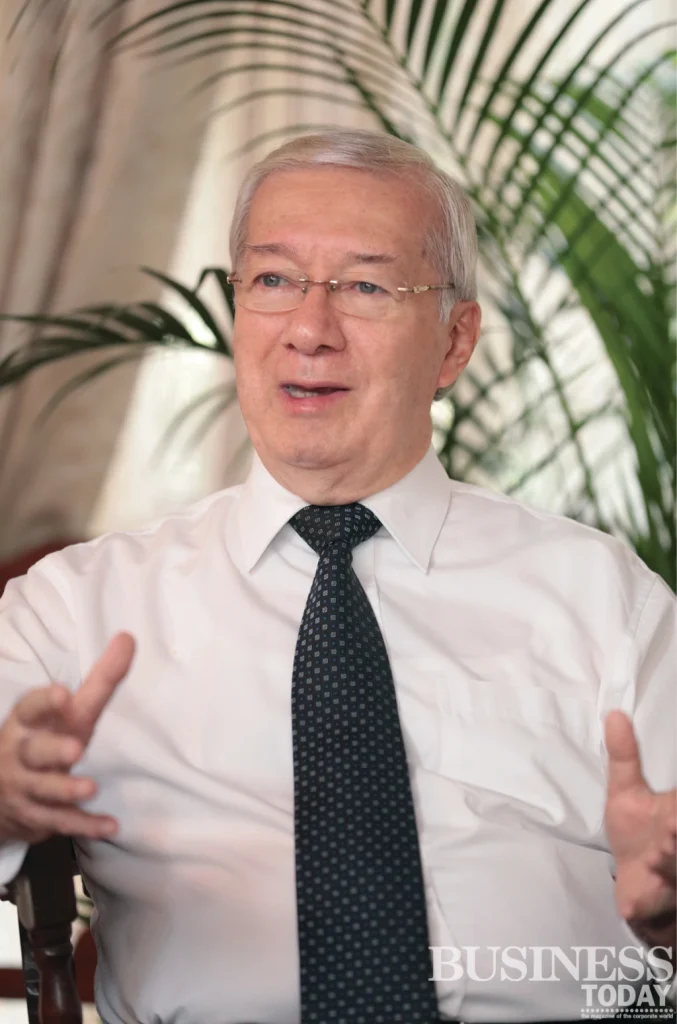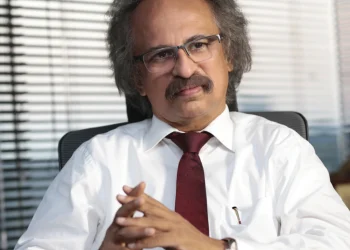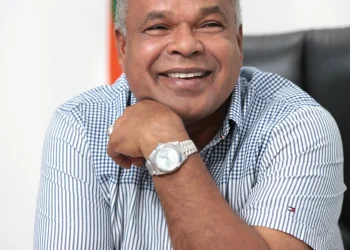
The Colombo Tea Traders’ Association (CTTA), has guided the destiny of the Ceylon Tea Industry through triumphs and challenges from almost its inception. CTTA will be celebrating its 125th anniversary in August 2019, and David Janszé, former Director, George Steuart, and Consultant to the CTTA, speaks about the history of the Association, its trials, achievements, responsibilities and future aspirations.
By Gayathri Kothalawala Assisted by Tatiyana Welikala
Photography Menaka Aravinda
Can you tell us about the history of the Colombo Tea Traders’ Association?
The tea industry formally commenced in 1867, when the first commercial plantation, Loolecondra Estate, began manufacturing tea through the conventional process. Initially, planters sold their production at private auctions held in the offices of brokers. However, by the early 1890s, volumes had reached a sizeable proportion and a formalised system of sale, with appropriate regulatory measures, became necessary.
At the exhortation of the producers, the Ceylon Chamber of Commerce (CCC), in 1894, formed the Colombo Tea Traders’ Association, to regulate and monitor the affairs of the Tea Trade and to manage the sale of tea in a formal, disciplined and efficient manner. Its first task was to compile a set of rules that would facilitate the sale of tea in a systematic way.
Consequently, the Colombo Tea Auction was formalized in 1894, coinciding with the establishment of the CTTA. The CTTA was assigned the responsibility of steering the Trade and ensuring that the most conducive conditions prevailed to generate optimum prices and quality standards of tea, whilst conducting the Colombo Tea Auction professionally.
At the outset, there was some contention regarding the composition of the CTTA committee, but finally, in 1898 there was consensus that the committee would comprise four buyers and four sellers, with the Chairman of the Ceylon Chamber of Commerce serving as Chairman in an ex-officio capacity.
The Ceylon Chamber Of Commerce (CCC), In 1894, Formed The Colombo Tea Traders’ Association, To Regulate And Monitor The Affairs Of The Tea Trade And To Manage The Sale Of Tea In A Formal, Disciplined And Efficient Manner.
As the production of tea expanded, the responsibilities and functions of the CTTA increased and, amongst the other roles it played, it was regularly consulted by the colonial Government on the determining and formulation of statutory matters.
With the granting of Independence, the prospect of Ceylonisation of the Trade emerged, culminating with the election of the first Ceylonese Chairman of the CTTA – Austin Perera – in 1968. He was one of three in the first batch of Ceylonese to be introduced to the tea trade in 1945, as Tea Tasters.
Following the implementation of the Land Reform Act and the subsequent nationalization of all plantations, the Sri Lanka Tea Board (SLTB) was established in 1976, as the Regulatory Authority for the Tea Industry. The Colombo Tea Auction was also vested in the SLTB, as the State owned virtually the entire tea production and, therefore, had the right to control its disposal. However, since the newly created entity was unfamiliar with the tea industry, it prudently, did not attempt to take over the function of conducting the auction, and the Colombo Tea Traders’ Association was permitted to continue managing the tea auction, in view of its experience and expertise in doing so. This arrangement, by which the Colombo Tea Traders’ Association managed and conducted the Colombo Tea Auction, was formalized through a Gazette Extraordinary and, consequently, it continued without a break, with the SLTB’s ownership, in the main, being nominal. In as far as the Industry at large was concerned, the SLTB’s role was confined to that of a regulatory nature, apart from driving promotional initiatives.
The nationalisation of the plantations saw the standard of the product and the volume of production gradually decline. The plantations were operating at such immense losses that they were rapidly draining the country’s economy. In 1992 the Government decided that it could no longer manage the plantations viably. While the estates continued to be State owned, the management was transferred to the private sector. The CTTA played a significant role in this transition and within three years a dramatic improvement was recorded both in production and quality.
After being stymied in any progressive initiative by the two giant State Corporations that managed the plantations for sixteen years, the CTTA recovered its dynamic role from that point onwards. Two new sectors emerged in the form of smallholders and privately owned factories. The various stakeholders affiliated to the CTTA were revitalized and actively participated in the affairs of the industry through their representation on the CTTA committee, albeit without voting rights. The CTTA committee, by now, had developed into a more visionary force. Its core committee comprised five Buyer representatives and five Seller representatives elected by the membership through secret ballot, and a representative of the Brokers, who did not have voting rights, just as the representative of other stakeholder associations were denied this privilege. However, they were all encouraged to participate in the deliberations, with the single objective of uplifting the industry.
A later development was the granting of the Brokers two seats on the Committee, but now with voting right.
The CTTA Played A Significant Role In This Transition And Within Three Years A Dramatic Improvement Was Recorded Both In Production And Quality.
It was finally determined that it was opportune to take the decisive step, which had been a long time in coming, and in 2014 the Colombo Tea Trades’ Association was Incorporated and formed as a Company, limited by guarantee, under the Companies Act No.07 of 2007, on May 20, 2014, to take over the assets and to carry on the functions of the Colombo Tea Traders’ Association. The Company retained the name, “Colombo Tea Traders’ Association”, without the addition of the word “Limited”.
What are the other responsibilities that the CTTA assumed over the years?
To commemorate its 100th anniversary, the CTTA hosted an International Tea Convention in 1966. It was the first major gathering of the global tea community from all the leading tea consumer and producer countries in the world, representing all sectors of the industry. The event was hailed as an overwhelming success. On account of the turmoil created by the nationalisation of plantations, no further such international events were organized till 1992. From then onwards, every four or five years, the CTTA organised international tea conventions, which were well attended, with large numbers of foreign delegates. These never failed to attract numerous plaudits.
In 1964, the CTTA held, for the first time, the Colombo Tea Trade Dance, the proceeds of which were donated to charity. The dance was discontinued until the 1980s, when it was revived as an annual event and the proceeds were donated to specially conceived projects associated with the tea industry.
The International Tea Conventions generated substantial funds and profits. Together with the proceeds from the Colombo Tea Trade Dance, as well as the funds generated by the conducting of Charity Tea Auctions, held periodically to commemorate special occasions in the Tea Industry, the CTTA established the Colombo Tea Traders’ Charity Trust, undertaking several significant charity projects mainly in the tea industry.
The CTTA Is A Respected Institution, And Is Acknowledged As The Apex Body Of The Tea Industry.
They particularly focused on the aspects of labour welfare. Of course, the plantation companies were providing certain welfare services, as well. But the CTTA offered something beyond that and performed a vital role in the industry. It also assisted the Government to better understand the industry and to ensure that decisions were taken in its best interests.
The CTTA is a respected institution, and is acknowledged as the apex body of the tea industry. All the other stakeholder associations are affiliated to the CTTA and are given seats on the committee without voting rights. It is an extremely representative body and is the association of the industry that is mainly consulted by the Government on trade matters.
How does the CTTA interact with the global tea industry?
The CTTA is also renowned internationally. For instance, the Food and Agriculture Organisation of the UN (FAO) Inter Governmental Group on Tea, comprising representatives at State level from every tea consumer and producer country in the world, convenes periodic meetings to determine issues relating to international standards, chemical residues and others. The FAO invites the CTTA to attend these meetings as an observer. However, they make certain to heed the CTTA’s advice, because it is considered a knowledgeable and unbiased association. Consequently, the CTTA plays a role in influencing the global tea industry.
What are the plans to commemorate the 125th anniversary of the CTTA?
Since the CTTA had an impactful international convention in 2017 to celebrate the 150th anniversary of Ceylon Tea, it intends conducting a domestic convention to celebrate the 125th anniversary of the CTTA. A special annual general meeting, coinciding with the date of its founding, will also be held.
Furthermore, a commemorative publication, covering the historic development of the CTTA, is in the process of being compiled. It will also elaborate on the responsibilities of the association, its contributions to the industry, the complications it confronted during the first and second World Wars as well as during the civil unrest in the country.
How has the CTTA helped the industry to grow?
CTTA has helped the industry tremendously by collaborating with all the stakeholders and making appropriate decisions. Each and every stakeholder is engaged, and given the opportunity to clearly express their views. The committee arrives at the decisions related to the industry during its monthly meeting. Moreover, the representatives of the other stakeholders are granted the opportunity to join the discussion; they cannot vote, but their voice is heard. Everyone’s interests are attended to; if a particular sector has a problem, it submits it to the CTTA committee for a solution, and following discussion, a pragmatic conclusion is invariably reached.
While the 12 committee members have voting rights, every decision has been reached without casting a vote; it has been found unnecessary, because there is unanimity. Everything is conducted judiciously, discussions are unbiased, and their priority is the industry, which takes precedence over the individual interests of the buyers, sellers, brokers or the other sectors.
Over the 125 years of its existence, the CTTA has faced several crises, which have, sometimes, severely affected the industry. At times, State assistance is sought. A recent instance was the Government’s ban on a certain herbicide – the most effective, most affordable, and safest – on unproved allegations that it caused cancer and kidney problems. As a consequence, the industry was forced to explore other avenues. Manual weeding was unfeasible; it is labour intensive, costly and resulted in soil erosion and degradation. Therefore, there was no option but to resort to more expensive herbicides, which created problems due to residue retention. Chemical residues in excess of permissible levels were detected in the tea. Consequently, the overseas buyers were reluctant to purchase Ceylon Tea. After intense discussions, the CTTA persuaded the Government to lift the ban on the herbicide. This is one example of a successful accomplishment of the CTTA on behalf of Ceylon Tea.
The CTTA Will Continue To Be Responsible For The Best Interests Of The Ceylon Tea Industry.
The CTTA is highly regarded by the global tea community for its competence and efficiency. The CTTA managed Colombo Tea Auction is recognized as a model by international buyers and sellers, and many from around the world, who are in some way or another associated with the tea industry, visit Sri Lanka to witness the auction in operation and to benefit from the experience.
What is in the future for the Association?
The CTTA is convinced that the Tea Auction should be computerised. Its aim is to ultimately automate the entire system and achieve traceability of every invoice of tea from the bush to the ship’s rail. It would enhance transparency and efficiency throughout the value chain and would complement the CTTA’s overwhelming aspiration of ensuring inviolable integrity throughout the industry. It emphasizes to those in the industry that competitiveness can be achieved through skills; skill in evaluating teas and identifying the most suitable for one’s purposes, skill in operating at the auction and procuring the most appropriate teas at the most competitive prices, skill in the judicious blending of teas purchased at the auction in matching a buyer’s standard. These are the attributes that will give one the edge over competitors in a fair and ethical manner – not by engaging in questionable practices.
The CTTA will continue to be responsible for the best interests of the Ceylon Tea industry. Many countries import Ceylon Tea – one of the most expensive teas in the world and considered to be among the best in terms of quality. Thereafter, it is blended with tea of multiple origins to create a reasonably priced tea that suits the palates of each market.
It has been proposed that Sri Lanka would benefit by developing a similar operation, ensuring that a higher percentage of Ceylon Tea is blended with compatible teas from other origins, in order to offer a quality product at a competitive price, using the skills for which our tea trade is reputed. While there presently is some opposition and resistance to this concept, not always for the most virtuous reasons, it is hoped that eventually it will materialize in the not too distant future.





